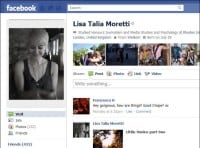INSURERS GETTING TO KNOW THE REAL YOU

Your social networking profile says it all
- Dateline
- 12 February 2012
Signing up for insurance now means less ink and more links. Complicated application forms have disappeared, but it’s time to hand over the links to your personal profile on your favourite social networks.
An automatic scan of your social identity, which is compiled by digitally stitching together all your numerous updates, now gives insurers a better picture of the ‘real you’. Tweets of what you’re having for lunch, check-ins at the gym, or photos of your big Saturday night out on Facebook, all clock up a series of positive and negative points that determine your monthly premiums.
Consumers love the instant quotes and vastly discounted rates that are provided by online insurers using this approach, and business has soared in short term and life insurance.
Another increasingly popular method of insuring products is through social shopping sites LivingSocial and GroupOn, as well as Facebook Deals.
Products acquired through these group purchasing sites may have only 24 hours attached to the one-off deal, but they come with an added perk; you have the option to insure your newly bought item at preferential rates through the online retailer’s insurance partner.
But questions surrounding ethics abound, especially in light of allegations that some insurers are using dubious methods, like employing their own hackers and online private investigators, to discover what potential clients are keeping ‘blocked’ or ‘hidden’.
There is a growing movement of disgruntled customers who are demanding more ‘opt-out’ options – this crowd is willing to pay a higher premium to keep their data out of the hands of financial institutions.
“We don’t trust the banks,” is their mantra. “Do you?” They also firmly believe that there are some things that are best kept entirely private.
Social networks are also getting twitchy, and in an effort to keep their communities happy, have released a number of statements saying that they’re hiking up security measures, for those who want to block insurers from their private lives.
The gap between a helpful service and invasion of personal data is getting scarily narrower by the day. How’s your profile?
ANALYSIS >> SYNTHESIS: How this scenario came to be
Social games for business
There’s a great article in Business Week (listed below) about how companies are taking tips from video-game designers to design fun new products in order to engage and advertise to consumers in new ways. This is perfect for the insurance industry – you’ll be able to share all your check-ins, all the web pages you viewed, all the apps you downloaded, on your own personal homepage that your network can tap into. So if you bought Nike running shoes, your health insurance company should give you points for that. If you checked into the gym three times in a week, you get bonus points. They’ll also be able to see if you paid for any speeding fines, or if you left your car on the side of a dodgy road because you were too drunk to drive home, and had to take a cab.
One of the dangers in this scenario is that privacy is going to get out of control, and advertisers are going to have a field day. But then people will become more savvy and start being very selective about what they choose to share, by way of advance privacy settings. You may find that hackers develop a new activity – hacking into their personal information to make it more favourable, or worse, hacking into other people’s information to make them less favourable.
Perhaps there will even be court cases in the future, against insurance companies who hack into consumers’ profiles, to view the behaviour they choose to keep out of the public domain. When last did you check your public profile?
Warning: Hazardous thinking at work
Despite appearances to the contrary, Futureworld cannot and does not predict the future. Our Mindbullets scenarios are fictitious and designed purely to explore possible futures, challenge and stimulate strategic thinking. Use these at your own risk. Any reference to actual people, entities or events is entirely allegorical. Copyright Futureworld International Limited. Reproduction or distribution permitted only with recognition of Copyright and the inclusion of this disclaimer.